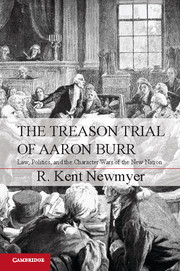Book contents
- Frontmatter
- Contents
- Acknowledgments
- Introduction
- Chronology of the Conspiracy and Associated Trial Proceedings
- Prologue A Mind-Jostling Trial
- 1 Jefferson and Burr on the Road to Richmond
- 2 Jefferson and Marshall Square Off
- 3 Legal Theater in Richmond
- 4 Treason Law for America
- 5 Judging the Judge
- Epilogue
- Index
- References
2 - Jefferson and Marshall Square Off
Published online by Cambridge University Press: 05 October 2012
- Frontmatter
- Contents
- Acknowledgments
- Introduction
- Chronology of the Conspiracy and Associated Trial Proceedings
- Prologue A Mind-Jostling Trial
- 1 Jefferson and Burr on the Road to Richmond
- 2 Jefferson and Marshall Square Off
- 3 Legal Theater in Richmond
- 4 Treason Law for America
- 5 Judging the Judge
- Epilogue
- Index
- References
Summary
“The worst of precedents may be established from the best of motives. We ought to be upon our guard lest our zeal for the public interest lead us to overstep the bounds of the law and the constitution; for although we may thereby bring one criminal to punishment, we may furnish the means by which an hundred innocent persons may suffer.”
Judge William Cranch dissenting, U.S. v. Bollman et al.The legal proceedings against Bollman and Swartwout – Jefferson’s personal effort to keep them in jail; the habeas corpus writs sued out on their behalf; their trial in the federal circuit court for the District of Columbia; and their appeal to the Supreme Court of the United States – have been overshadowed by the more dramatic trial in Richmond. What transpired in Washington in early 1807, however, was a dress rehearsal. Lawyers and judges clashed over the definition of treason. Matters of evidence that would ultimately surface in the Richmond trial were vetted. Defense and prosecution lawyers, some of whom would meet again in Richmond, took measure of one another. Finally, thanks to the legal transgressions of General Wilkinson in New Orleans and Jefferson’s personal involvement in the Bollman and Swartwout litigation in Washington, the president and the chief justice squared off once again. What happened was a replay of their confrontation in Marbury v. Madison; it was also a forecast of what was about to transpire in Burr’s treason trial in Richmond.
By the time Jefferson and Marshall clashed in Bollman, their intense dislike and distrust of one another was full-blown. It was also counterintuitive. As descendents of the Randolph family, both were members of Virginia’s ruling class. Both shared in the creation of the new nation – Marshall as a soldier in General Washington’s Continental Line and Jefferson as a statesman and spokesman of independence. In the partisan 1790s, however, they parted over the meaning of the Revolution they had jointly supported. Jefferson chose to see the Revolution as the dawning of a new era of liberty and political democracy embodied in state and local government. As a moderate Federalist, Marshall emphasized the conservative nature of the Revolution. For him the war against England was a struggle for self-government, not the first stage in a social revolution – in his words “a war of principle, against a system hostile to political liberty.”
- Type
- Chapter
- Information
- The Treason Trial of Aaron BurrLaw, Politics, and the Character Wars of the New Nation, pp. 46 - 67Publisher: Cambridge University PressPrint publication year: 2012



